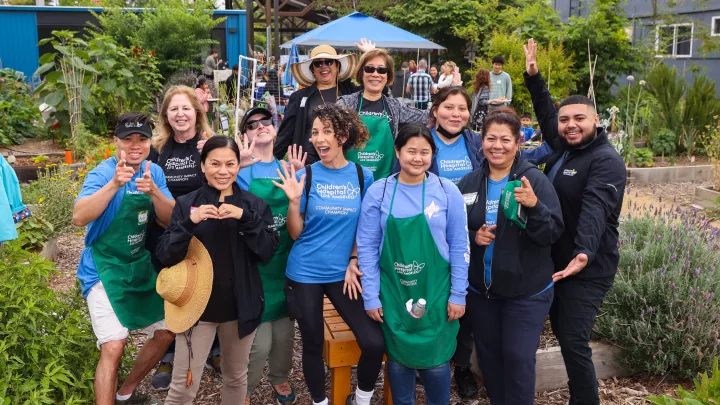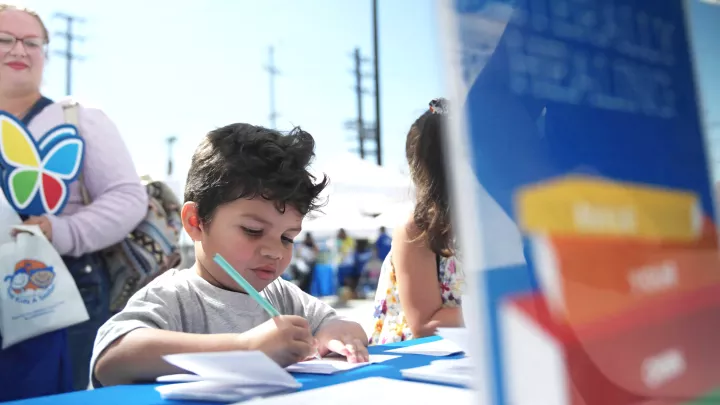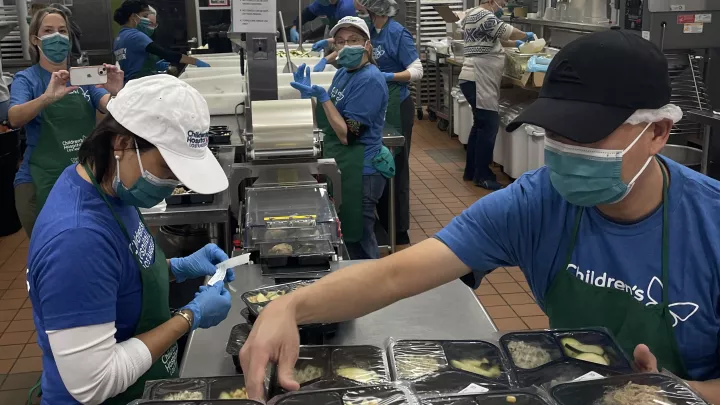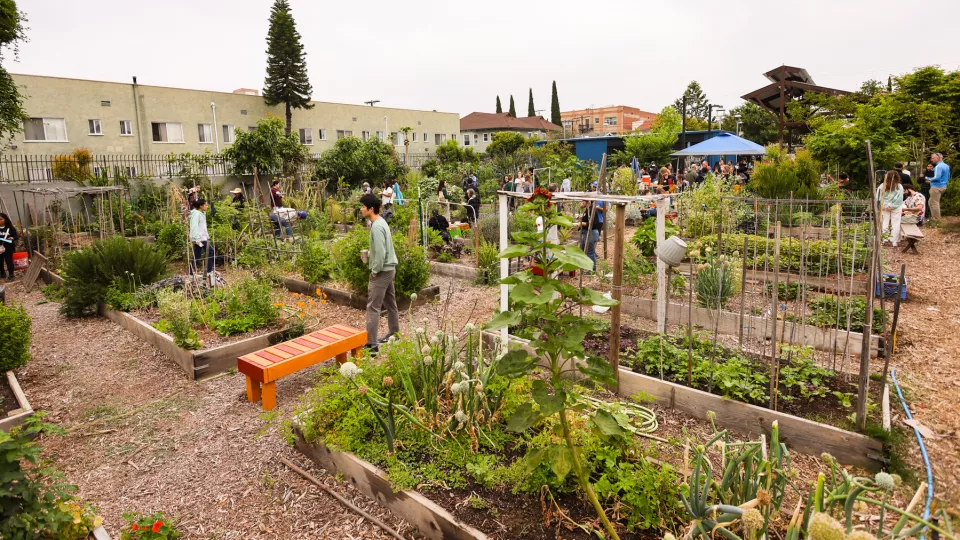
The East Hollywood Community Garden
Planting Healthier Futures
The COVID-19 pandemic brought much-needed attention to a number of community health issues—in particular, the impact on people who lost their jobs, and children for whom remote learning meant the loss of meals that school once provided.
Food insecurity—one of those issues that drew a larger spotlight—was a problem well before the pandemic, says David Valdez, Project Manager, Office of Community Affairs, Children’s Hospital Los Angeles.
Not only did food insecurity predate COVID-19, he adds, it has never had just one face or category of need.
“For a children’s hospital like us,” Valdez says, “food insecurity can affect a family whose lives are changed because of a diagnosis. Or maybe they weren’t food insecure before but are now.”
Food access hub grows
The universal need for access to healthy food is among the priorities driving CHLA’s good neighbor initiatives. CHLA continues to strengthen its food access hub by deepening relationships with community gardens that support patients, their families and the local community.
In 2021, CHLA sponsored the launch of “The City’s Garden” at Los Angeles Community College (LACC), collaborating with LACC Foundation on the student-led project. Volunteer team members in CHLA’s Community Impact Champions Network helped to plant and maintain the garden.
In 2023, the hospital put its fresh food-conscious commitment into action again with its support for the East Hollywood Community Garden, which had been forced to forgo large gatherings as COVID-19 began to spread.
“During the pandemic, East Hollywood Community Garden became a safe place and an oasis for residents and families,” says Valdez, “and somewhere they could learn about different vegetables and ways to prepare food.”
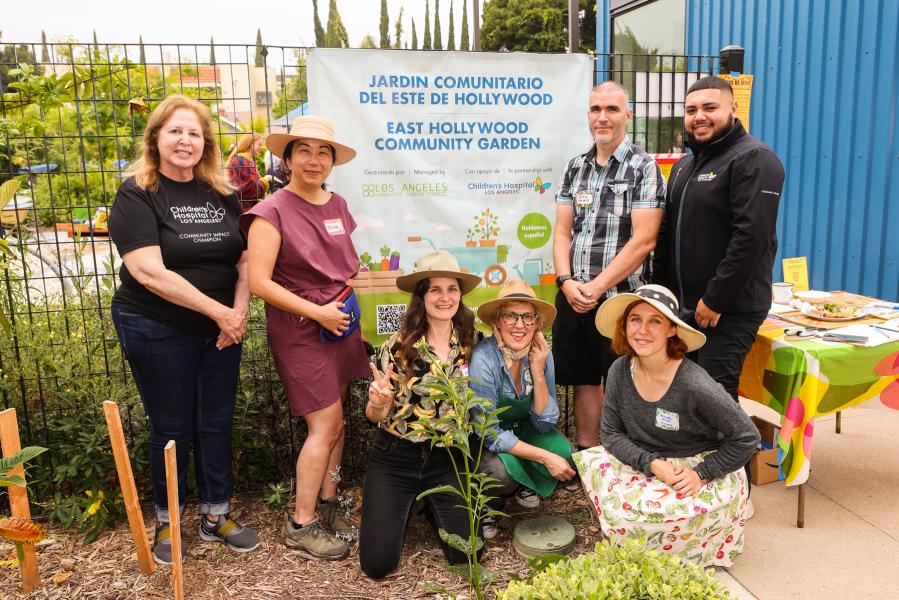
CHLA sponsored the garden’s Summer Kickoff on June 10, 2023, next to Madison Avenue Park in Los Angeles, which drew more than 100 area residents and CHLA team members.
With 31 individual plots and a waiting list of gardeners, the urban green space also provides a communal gardening area for multiple neighbors to grow their own food. The land spills over with ripening tomatoes, zucchini, melons, carrots, herbs and more. The garden also hosts educational workshops, including a recent one that featured a CHLA dietitian who demonstrated the “MyPlate” guidelines for balanced, nutritious meals.
A grassroots movement
“Community gardens like East Hollywood have always been a grassroots way of restoring land, creating more green space, and providing opportunities for public health and food security,” says Omar Brownson, Executive Director of the Los Angeles Community Garden Council, a nonprofit advocate for 47 community gardens in the city of Los Angeles, including East Hollywood.
Other aspects of CHLA’s food access hub include joining with the East Hollywood Neighborhood Council and Rick’s Produce Market to distribute free produce on a bimonthly basis to the community—a program that gave out over 39,000 pounds of fruit and vegetables from July 2022 to June 2023 alone.
“Our main focus is to provide the community with items they typically use on an everyday basis,” says Valdez. “We also like to incorporate more seasonal items throughout the year and introduce people to new foods and flavors.”
CHLA also supports nonprofits hosting giveaways of holiday turkeys, packaged items and hot meals, as well as the hospital’s annual Community Wellness Festival.
Last held in October 2023, the Wellness Festival attracted a crowd of more than 600 to the corner of Fountain Avenue and Virgil Place in L.A., where the hospital sponsored a giveaway of 6,000-plus pounds of fresh produce to attendees. About 2,000 pounds of dried goods also were provided through CHLA’s partnership with the Los Angeles Regional Food Bank.
A pattern of gardens
The partnership between Children’s Hospital and community gardens is a natural, says Brownson. Ordinary citizens grew “victory gardens” during World War II, providing 40% of the fresh vegetables in the U.S. by 1944, he points out. “It’s an old idea that’s new again,” he says.
The hospital’s sponsorships for community gardens is expected to grow. CHLA is exploring other possible veggie-growing sites near CHLA’s satellite clinics.
Valdez often gets asked just what is a “food access hub”? Is it a physical space? He tells people, “No, it’s a system”—composed of partnerships with community organizations, community engagement and advocacy, food education, outreach and social impact.
“We want to build an innovative and connected food system in Los Angeles,” he says, “because we care for kids and families, and we care for this community.”
